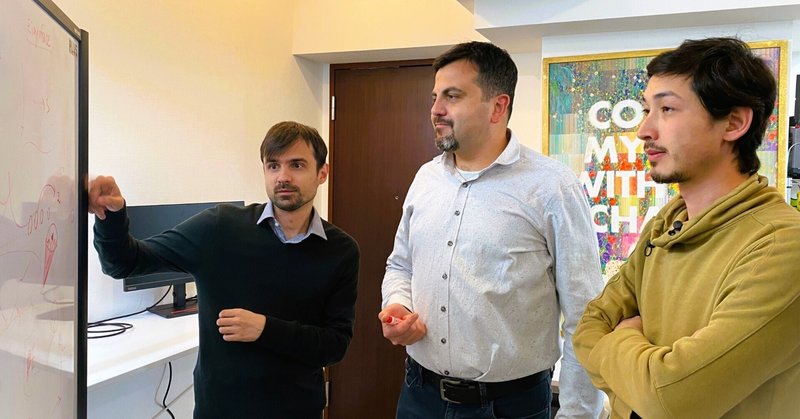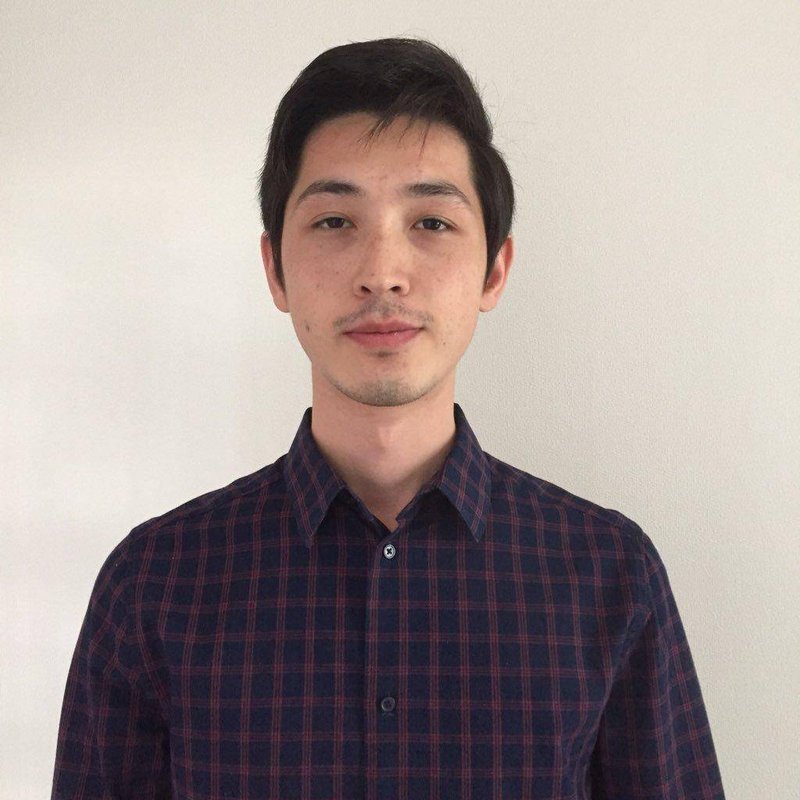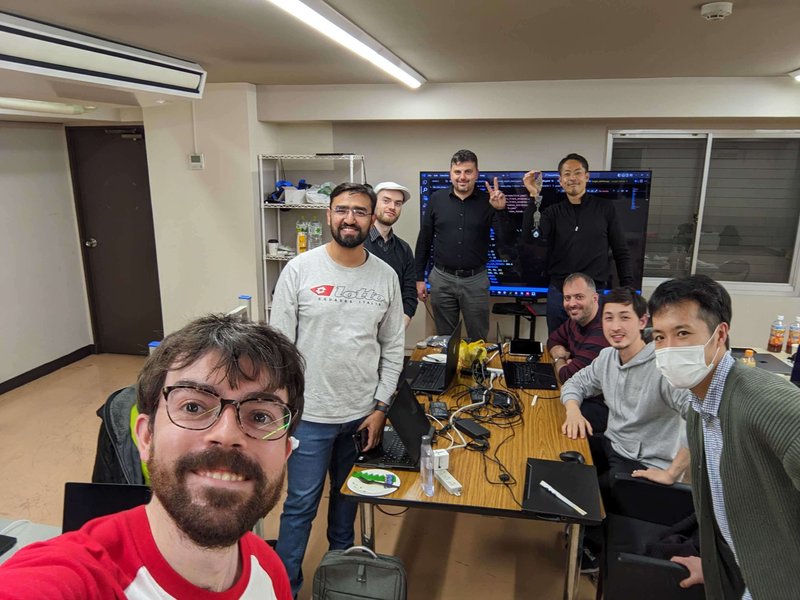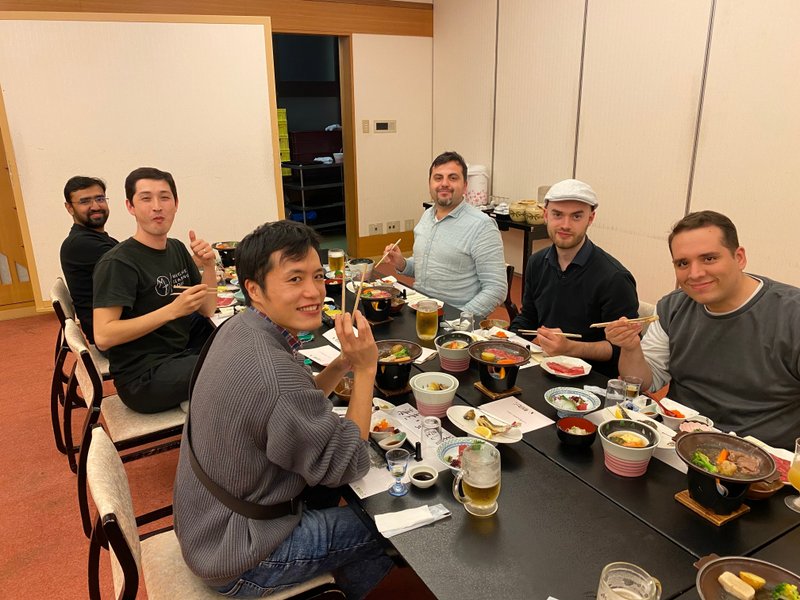
Our AI Vision team leader explains the challenges and excitements of ROMS’ piece picking system
Our 4th blog entry comes with the introduction of Ali, the leader of AI vision team. Ali joined ROMS in June 2022 after working for several companies including an established one and some startups. While the Material Handling team led by Iwata-san in the 1st entry is the heart of our system, Ali’s team is responsible for the eyes and brain for our piece picking system. Ali explains the challenges and excitements of ROMS’ piece picking system.

Also, ROMS has always valued diversity and inclusion since its incorporation by both Japanese and Polish members back in 2019, with non-Japanese members currently taking up almost 40% of all the members. He will describe how this DNA is enrooted in ROMS and why ROMS is an attractive place to work not only from an engineer perspective, but also from a non-Japanese perspective.
Collaboration between business and tech team
After finishing my bachelor's degree, I studied for my master’s degree in Turkey. Right after finishing it, I joined an AI Lab in Turkey and started my PhD. However, during my PhD I wanted to go abroad to broaden my horizon by having an industrial experience. This is how I came to Japan.
In Japan, I started my internship at Rakuten and started to stay in Japan. Since then, I have worked for different startup companies - The first one was a Japanese startup called PKSHA Technology, the second one for a Singaporean company called Browzzin, and then I joined ROMS last year.
Speaking of Japan and startups, Japan, for me, is the safest country - no stress from a living perspective. Having worked for both an established company and startups, I personally much prefer the startup culture in Japan as a working environment because it is a kind of mixture of good Japanese and Western culture. In other words, it is fast but reliable enough.
I was first introduced to ROMS through a long-time friend of mine who is also a recruiter. When I talked with him, he was so passionate about explaining ROMS that I sensed that this company may be something special. That was my important starting point to get to know ROMS.
After having some discussion, I was fascinated by technical challenges that ROMS is tackling – challenges are always exciting for engineers. However, the most compelling thing for me was the business team. I had a meeting with Yosuke and Katz in the beginning and felt relieved by their open and friendly attitude, so I felt as if we had been friends for a long time. In addition, when we had a business discussion about my past AI-related businesses, they quickly assessed them and hit the right answers which I felt were accurate based on my experience. I was very impressed by their ability of quick assessment and was convinced that they knew exactly what they were doing because, even if a company has the best products and world-class engineers, it is meaningless without having a trusted business team to make it happen. Technical challenges, open flat culture, and a trusted business team convinced me to join ROMS.
Such initial thoughts were validated after joining the company. I saw collaborations between the business and tech team all the time. It’s very encouraging for engineers that the business team is knowledgeable about technology at some level and has empathy for the tech team, which makes the communication always two-sided. This means a lot to me.

AI vision team - Eyes and brain for robots
Right now I'm in charge of the AI vision team and this team is closely working with the robotics team. I'm also part of the data science team and develop some data analytics functions.
Let me start with the AI vision team. Our product is to deliver orders. Once we receive orders, RCS (Robotics Convenience Store) or NFC (Nano-fulfillment Center) should prepare the order and make it ready for a customer or operator to pick up. To do so, we need to pick and assort the items – this is where we need some sort of intelligence. The robot needs eyes and a brain and AI vision team's efforts are to process that data as the eyes and brain of the robot.
For example, before the robot picks up the item, we must localize it – to know where the item is. And even after localizing, you still cannot pick one from a random place. We need to tell the robot where to pick the item from. Moreover, after picking the item we need to place it in an organized manner. Prioritization of handling multiple items is another challenge as well. All of these seem quite easy if you are a human – as we have a natural intuition of which item should be picked first or where and how we pick and place the item, but in the case of a robot, it doesn’t go that easy. The AI vision team is working on these.
Speaking of the data analytics part, we have items in the automated warehouse which means that obviously, there should be some kind of optimization. For example, if you believe that we are going to sell item A in the next two weeks, we have to stock it in the warehouse. As for this one, we need to forecast the future sales. This is one use case of data science. Another one is, you cannot have all the products in the warehouse because of the limitation of the space and this brings the challenge of optimizing this space - which items should we store and how much it should be stored considering the period of the restocking and a space capacity.
Especially for the AI vision part, challenges of our team come from the industry we're operating in, which is retail. In the retail industry, items to be picked are not always constant due to product reversions and abolitions, which means you have to have the AI models and the system that can be adaptive enough for new items, without having a pre-set product master with dimension, weight, and package, etc. solely for the robot picking.
How to deal with the constantly changing items
With that said, I believe we have a very strong team to tackle these challenges.
We have conventional computer vision engineers as well as AI engineers. Moreover, we have some PhDs, especially in AI and robotics, who can inject the academic viewpoints to propose the unique solutions for the challenges. This is the uniqueness of our team; research knowledge and industrial developments go hand by hand.
For example, with constantly changing products, this needs the adaptation of AI. In deep learning-based AI, this is one of the biggest problems which we call the “out of distribution” problem. If we train our model for certain products but we have new items, the deep learning models, as it is, cannot do the detection or processing of this data because they are just out of distribution. This needs to be solved in our case with some kind of feedback loop. The system should remember its previous failure cases and try to learn by time, which means whenever we have new items, it is just a matter of time for the robot to learn to adapt to the items. And all these things should be done automatically. If we do it manually, it doesn't make sense for customers.
We know what we are doing. We know what kind of challenges we have. And most importantly, we know how to do it.
ROMS values diversity
Getting back to my encounter with ROMS, it is not that I had no concerns about culture back then because I did not talk with everyone before joining ROMS. Independent of ROMS, if you're working with multicultural teammates, of course it brings some difficulties to manage and to maintain the communication, it is a natural thing. However, what I was very impressed by when I joined ROMS was that each team and each person in the team in the company is very easy to work with and easy to communicate with. It is also fortunate for non-Japanese members who do not speak Japanese that almost all Japanese members can speak English. I have heard from other engineers that their managers don't speak English and engineers don't speak Japanese, which ends up with almost no communication. If that is the case, you cannot develop a product. Even though we have potential challenges of embracing multi-culture in the future, I think we have been doing pretty well and I don’t think it would be a problem for non-Japanese members.
Another good point about ROMS is that the age range is so close and people at ROMS share the similar life stage with having kids and families. This makes everything so much easier for me as a father of a boy. I am not the only person in the company who has kids. People have empathy and understanding of the difficulties of raising kids while working.
Personally, it is actually a very interesting time in my life having a kid who now needs a certain amount of time commitment from me. I go to a school with my wife and kid to have a common time on weekdays and I try to dedicate my time for him on weekends. I would honestly say that it is busier on weekends, but it is precious for me as well. I enjoy every piece of this moment.

ROMS is like a combination of several startups
Lastly, I am very honest to say that ROMS is one of the best startups to work for in Japan for several reasons:
There is an environment where you can showcase your skills to the full extent.
There are a lot of technical challenges. Again, challenges mean excitement for engineers.
There is a trusted business team which is open and quick in making good decisions. I was and am still fascinated about the speed of decision making in ROMS. This is just mind blowing and makes engineers feel comfortable about not having bureaucracy.
You can broaden your horizon and help grow your skills.
About the last point, I am always describing to the candidates that ROMS is a combination of five to six different startups. We have an end-to-end product: hardware, software of the hardware system, web development, back-end, dashboard, Kiosk, data science, and so on and so forth.
This would definitely help you extend your skill sets. For example, as an AI engineer, I have a chance to talk with the robotics team and I can learn robotics in a natural way. If you have any problems, you can also consult and ask for collaborations to other teams easily and quickly, it is just a matter of sending a message on Slack. This could not have been done so quickly if we outsourced one of the parts of the development. We have this kind of advantage and uniqueness.
If you have an interest in working with us, please apply from here. We look forward to meeting you!
